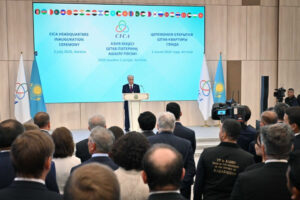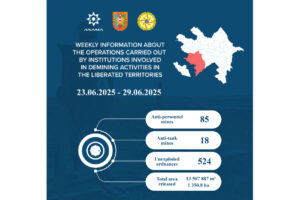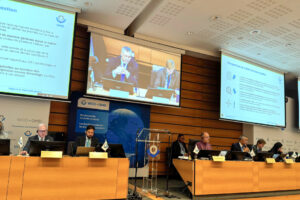Tokyo, 2 June, /AJMEDIA/
A 40,000-yen-per-person tax cut program began on Saturday in Japan to ease the pain of inflation felt by households as Prime Minister Fumio Kishida, hit by low approval ratings, seeks to make the benefits of government support more visible to disgruntled voters.
Of the total reduced under the new temporary scheme, 30,000 yen is from income tax, and 10,000 yen is from resident tax. High-income earners who receive 20 million yen or more annually will be excluded, with cash handouts given to those earning low incomes, such as those exempt from paying both taxes.
A household of three — an income earner, a spouse and a child — will be entitled to a 120,000 yen cut, for instance.
The program will cover some 95 million people as a major feature of the government’s efforts to help consumers at a time when wage growth has yet to outpace inflation. Workers can see their income tax payments reduced on their pay slips.
Municipal governments will not charge residential tax for June across the board. They will then deduct 10,000 yen from the total amount of residential tax that each person has to pay a year, and people will pay the remaining amount over the next 11 months from July.
“We will create an environment in which income growth will outpace inflation and end the deflationary mindset” rooted in the country’s experience with falling prices, Finance Minister Shunichi Suzuki said before the tax cut was implemented.
For people already paying less than 40,000 yen in income and resident taxes, the government will make up the shortfall by distributing cash.
If a household of three is supposed to shoulder 75,000 yen a year, they will be exempt from that amount and get an additional 50,000 yen in cash as the 45,000 yen shortfall is rounded up. This will enable them to enjoy the same benefits as other three-member households entitled to a 120,000 yen reduction, according to the government.
Lower-income households exempt from paying income and resident taxes are entitled to 70,000 yen in payments per household.
The government has taken measures, including cash handouts, to cushion the blow to households amid the COVID-19 pandemic and inflation, initially caused by higher energy and other raw material costs due to Russia’s war on Ukraine.
The latest tax cuts will cost the government an estimated 3.28 trillion yen.
Kishida has prioritized achieving economic growth before fiscal rehabilitation, as the fiscal health of the heavily indebted country remains the worst among advanced nations. Rising interest rates and increased debt-servicing costs will likely squeeze its spending.
Analysts question how effective the program is in supporting private consumption after weak domestic demand caused the economy to report its first negative growth in two quarters in January-March.
According to an estimate by Mizuho Research & Technologies Ltd, Japanese households will likely have to shoulder about 106,000 yen more in the current fiscal year from April compared with the year before amid the rising cost of living.
Some ruling party lawmakers are now calling for extending the temporary tax cut.









































